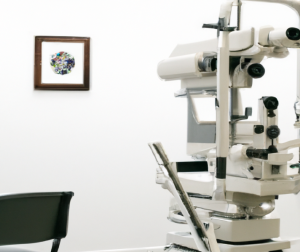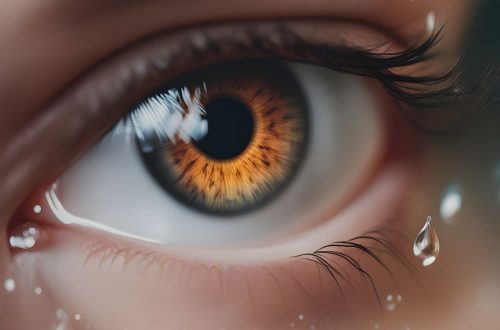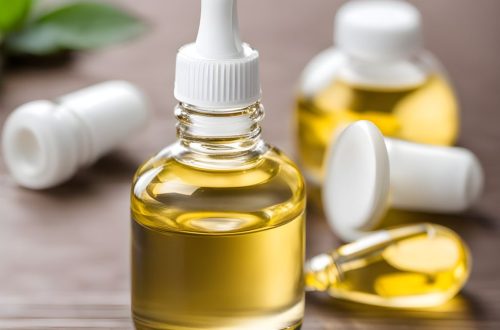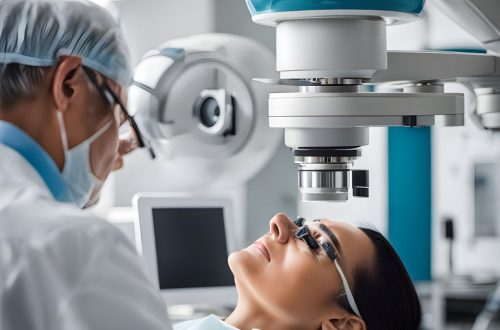5 Essential Vitamins for Enhanced Vision
Finding out how diet may safeguard our eyesight has been my objective ever since my family’s yearly reunion devolved into an unplanned conversation about our shared struggles with visual issues. Finding that our nutrition might have such a significant influence on our eyesight was remarkable. As I struggled with sore eyes from prolonged computer use while my grandmother battled age-related macular degeneration, the search for nutritional remedies got more intimate. My investigation into the necessary minerals and vitamins that may improve and preserve our eyesight was prompted by this trip.
The material I discovered was motivating and educational, covering topics like the function zinc and omega-3 fatty acids play in health, the antioxidant potential of vitamin E against age-related ailments, and the potency of vitamin A in preventing night blindness. As I dug more, I found that we might possibly protect our eyesight for years to come by making little dietary adjustments that would boost our eye health enormously.



Vitamin A: The Vision Enhancer
Among its many advantages, vitamin A helps us see better, protects against night blindness, and relieves dry eyes. This vitamin is vital to our bodies in order to keep our eyesight healthy and our retinas operating properly. Retinol, retinal, and beta-carotene are among the group of molecules that make up Vitamin A, which is an interesting fact. The fact that our systems can transform beta-carotene, a plant-based precursor to Vitamin A, into retinol—a form of the vitamin that can be used—makes it especially significant.
Role of vitamin A in the synthesis of rhodopsin, the protein in our eyes that enables low-light vision, is one of its intriguing features. Adequate consumption of Vitamin A is essential in avoiding night blindness since it severely impairs our capacity to see in low light.
Liver, dairy products, fish oils, and eggs are the finest sources of vitamin A. These foods of animal origins directly provide retinol. Brilliantly colored fruits and vegetables like carrots, sweet potatoes, spinach, and kale are great options for those who prefer plant-based diets. We can produce vitamin A from beta-carotene, which is present in these. By protecting the eyes from oxidative stress and so lowering the risk of macular degeneration and cataract development, the conversion process of beta-carotene also confers benefits to humans, such as the ability to consume a greater range of foods.
Vitamin A has a vital part in immune system function, skin health, and cell proliferation in addition to its crucial involvement in eyesight. Because of its adaptability to a variety of physiological processes, vitamin A-rich foods should be included in our meals in a balanced manner. Consuming these foods on a daily basis is essential to maintaining excellent eye health and general well-being since the body can only retain a certain amount of Vitamin A.

Vitamin C: Antioxidant Power for Your Eyes
The antioxidant known as vitamin C is very effective in protecting against eye disorders and preserving eye health. In addition to supporting the health of the blood vessels in our eyes, research indicates that this vital vitamin may prevent cataract formation by increasing the quantity of water in the lens of the eye, which enhances focusing and lowers the likelihood of cataract development throughout time.
Furthermore, and perhaps most importantly, vitamin C helps prevent age-related macular degeneration (AMD), which is the main cause of visual loss. Vitamin C aids in maintaining the integrity of the retina and maintaining eyesight by scavenging free radicals, which are unstable chemicals that may harm cells, including those in the eye.
Vitamin C is mostly found in fruits and vegetables. Citrus fruits are well known for having high vitamin content, including oranges, grapefruits, and lemons. Strawberries, kiwi, bell peppers, broccoli, Brussels sprouts, and cantaloupe are some other fantastic sources in addition to citrus. A diet rich in these foods can help maintain good eyesight since they not only increase your intake of Vitamin C but also provide a range of other nutrients and antioxidants.


Since vitamin C cannot be produced by the body, constant dietary consumption is necessary. Supplementing with Vitamin C on a regular basis is essential since the human body cannot retain it for extended periods of time. The relevance of Vitamin C in general body health is highlighted by its antioxidant benefits, which go beyond eye health to include skin suppleness, iron absorption, and immunological function.
Just adding a squeeze of lemon to your water, eating citrus fruits as a snack, or including a range of vibrant veggies into your meals are easy ways to incorporate more Vitamin C into your diet. These eating practices exhibit the simple but profound ways that nutrition affects our well-being by satisfying both your palate and your eyes.
Read also – Eye Drop Recall.
Vitamin E: Your Ally Against Age-Related Eye Conditions
Strong antioxidants like vitamin E protect our cells from the damaging effects of free radicals, which are results of our systems breaking down food into energy or being in contact with hazardous substances in the environment. Given that it has been shown to reduce the development of cataracts and age-related macular degeneration (AMD), two prevalent disorders that may deteriorate eyesight as we age, this vitamin is very advantageous for eye health.
Vitamin E-rich foods include green leafy vegetables like spinach and broccoli as well as nuts and seeds like hazelnuts, sunflower seeds, and almonds. These vitamin is also abundantly available in plant oils including safflower, sunflower, and wheat germ oil. These foods supply you with a plethora of additional health-promoting elements that promote overall wellbeing, in addition to increasing your consumption of Vitamin E.
The antioxidant characteristics of vitamin E help shield the eyes from harm brought on by unstable molecules, which is why it is so beneficial for eye health. Regarding AMD, vitamin E helps to keep the retina’s healthy cells intact, which may slow down the disease’s advancement. As oxidative stress is believed to be a major factor in the formation of cataracts, vitamin E’s antioxidant properties may help shield the eye’s lens from it.
Beyond only preventing age-related eye disorders, vitamin E has many other advantages. Along with being essential for blood clotting, this nutrient also supports healthy skin, the immune system, and the body’s use of vitamin K.
It is important to regularly consume foods high in Vitamin E to ensure appropriate amounts of this crucial vitamin, since the body has a limited capacity to store it. Here are some easy methods to make sure you’re receiving enough Vitamin E to support your general health and eye health: include spinach in your meals or add a handful of almonds to your snack routine.
We may prevent typical aging effects on our eyes and preserve our eyesight by appreciating the value of Vitamin E in our diet. This underscores the significant role that nutrition plays in keeping us healthy.


Omega-3 Fatty Acids: Vision Health and Beyond
Proper development of vision and preservation of eye health depend on omega-3 fatty acids, especially EPA and DHA, which are contained in fish oil. The layer of tissue at the back of the eye that detects light and transmits pictures to the brain is called the retina, and it contains essential fatty acids. DHA’s important role in vision is shown by the fact that it makes up a significant portion of the retina’s photoreceptor cells.
Flaky seafood like salmon, mackerel, and sardines are natural providers of Omega-3 fatty acids. If you’d rather get your Omega-3 from plants, ALA may also be found in walnuts, chia seeds, and flaxseeds. The body can convert ALA to EPA and DHA to a lesser extent. By consuming these foods, you may improve your cardiovascular and cognitive health in addition to your eye health.
Beyond just improving retinal function, Omega-3s have other eye-health advantages. In addition to promoting tear production and ocular moisture, they are essential for preserving the surface of the eye. Dry eye syndrome is a frequent ailment when the eyes do not generate enough tears or the quality of the tears produced is poor. This is very helpful for those who suffer from this.
Studies indicate that macular degeneration and glaucoma, which may cause irreversible vision loss and blindness, may be prevented by taking omega-3 fatty acids. They may enhance the general health of the eye and lessen the chance of developing various eye conditions by lowering inflammation.
It might be proactive to maintain eye health to include Omega-3 fatty acids in your diet via food or supplements. Your eyesight and general well-being may be greatly improved by making minor dietary changes, such as include a portion of fatty fish in your weekly meal plan or adding flaxseed to your oatmeal in the morning.


Zinc: A Trace Mineral with Huge Benefits for Eye Health
Vitamin A is transported by zinc, a trace mineral, from the liver to the retina, where it is converted into melanin. Zinc has a significant effect on eye health. The pigment known as melanin serves as a barrier for the eyes, preventing damaging UV light rays from entering. Zinc has a critical role in preserving good eyesight because of its high concentration in the eye, especially in the retina and the layer of vascular tissue just underneath it.
Add shellfish (which have one of the highest zinc contents), beef, pumpkin seeds, chickpeas, and lentils to the list of foods high in zinc. Consuming these foods high in zinc can help protect your eyes against night vision issues and age-related macular degeneration (AMD). Grains, nuts, and legumes are excellent vegan or plant-based sources of zinc; however, keep in mind that the body does not absorb zinc from plant sources as quickly as it does from animal goods. You may improve zinc absorption by eating these foods together with a vitamin C source.
Beyond its involvement in maintaining eye health, zinc also plays a part in cell division, immune system support, and wound healing. Zinc particularly helps the enzymes in the eyes that are in charge of maintaining eye health and sharp vision.
Dietary habits, eye health, and overall well-being are closely related. Regular intake of zinc via a balanced diet may greatly lower the chance of developing severe AMD and strengthen the immune system. One easy, but powerful, way to protect eyesight and boost the body’s natural defenses is to make sure you’re getting enough zinc.



As we conclude our investigation into the vitamins and minerals that are critical for the best possible eye health, it is clear that diet is a critical factor in both preserving and improving our eyesight. The exploration of the advantages of vitamins A, C, E, zinc, and omega-3 fatty acids has not only shown the significance of each vitamin on its own, but also the ways in which they cooperate to safeguard and enhance eye health.
Incorporating these nutrients into our regular diet may provide a natural defense against common eye conditions and illnesses, demonstrating the therapeutic value of food. Having seen firsthand the beneficial effects of dietary modifications on eye health, I strongly advise you to include these nutritional tactics into your overall plan to preserve healthy, clear vision for many years to come.
Read also – Eye Relaxation Exercises.




